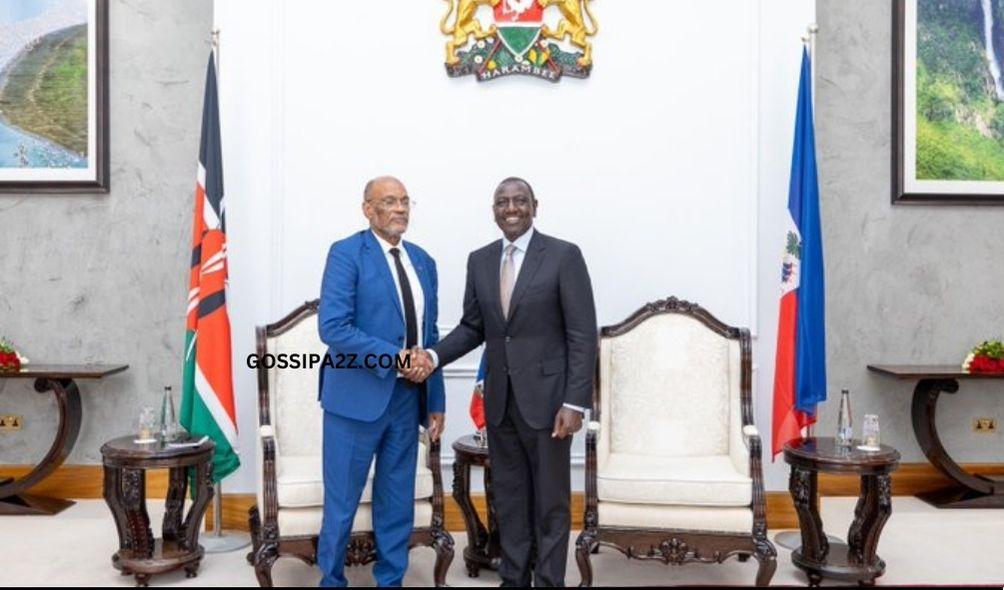Costly Trip: How A Visit To Kenya Sealed Haiti PM Ariel Henry’s Fate
Ariel Henry’s takeover following the assassination of President Jovenelle Moise in 2021 faced disapproval from the Haitian population, especially from the criminal gangs that subsequently unleashed terror in the Caribbean nation.
Assuming the role of Prime Minister without being elected, Henry’s ascent to power appeared to worsen the ongoing turmoil as gangs proliferated throughout the country, each vying for control and increased sway.
Subsequently, criminal gangs have been wreaking havoc in the country, leading to an increase in kidnapping incidents and a continuous stream of reported murders.
According to human rights organizations, approximately ten individuals are abducted daily in the city, as criminal gangs rely on ransom payments for their sustenance.
As the influence of gangs increased, a group called G9, headed by ex-police officer Jimmy Chérizier, also known as Barbeque, became more prominent in expressing opposition to the government’s perceived illegitimacy.
Henry’s leadership remained secure until he initiated a journey to Kenya on February 29, 2024, to finalize an agreement to establish a multinational security force supported by the United Nations to combat gang activity in Haiti. As part of the deal, Kenya committed to dispatching 1,000 officers.
The action triggered increased unrest, prompting Barbeque to demand Henry’s resignation and urge him to stay out of the nation.
He went so far as to warn of severe repercussions unless Henry either resigned or took any action to come back to Haiti.
“If Ariel Henry does not step down the country will suffer a genocide. If the international community continues to support Henrythey will lead us directly into a civil war,” he told media outlets.
While the Prime Minister was not present, gangs freed more than 3,500 prisoners from two major jails on March 5. This compelled Haiti’s de facto government to declare a 72-hour state of emergency and enforce nightly curfews.
ALSO READ:
- Nakuru in Chaos: Senator Karanja Accuses Governor Kihika of “Ghost Rule” Amid Year-Long Maternity Leave, Pushes for Impeachment
- Niger’s Coup Leader Sworn in as President for Five-Year Transition
- Jubilee Insider Drops Bombshell: Uhuru Kenyatta to Blame for Mount Kenya’s Political Downfall
- Kenyan Police Officer Killed in Haiti by Armed Gangs Identified as Benedict Kabiru
- Harambee Stars Goalkeeper Caught in Match-Fixing Scandal
The gangs subsequently seized control of Haiti’s primary airport, preventing Henry from entering the country upon his arrival from Kenya. As a result, he had to make an emergency landing in San Juan, the capital of the Dominican Republic.
His aircraft was subsequently redirected to the United States territory of Puerto Rico, and he has resided there ever since.
In the midst of intensifying tensions, Henry declared his departure on March 11, 2024, effectively relinquishing control to the criminal factions.
Local authorities have been participating in discussions with representatives from Haiti’s political factions, business community, civil society, and religious organizations. The goal is to form a transition council that will facilitate the process leading to the first elections since 2016.
Henry, deemed corrupt by numerous Haitians, consistently delayed elections, citing the need to prioritize restoring security.
In the past few days, nations in the area have recalled embassy personnel and recommended their citizens to depart.
The United Nations approximates that the ongoing conflict has forced around 300,000 individuals to flee their residences. Additionally, in the past year, criminal gangs have been responsible for the deaths of nearly 5,000 people and the abduction of almost 2,500. In some instances, these gangs employ videos depicting acts of rape and torture to coerce victims’ friends and families into paying substantial ransom.
In the latter part of February, the United Nations reported that five countries had officially committed military personnel, contributing an amount of less than Ksh.1.5 billion (equivalent to $11 million) to a designated fund.
Costly Trip: How A Visit To Kenya Sealed Haiti PM Ariel Henry’s Fate
